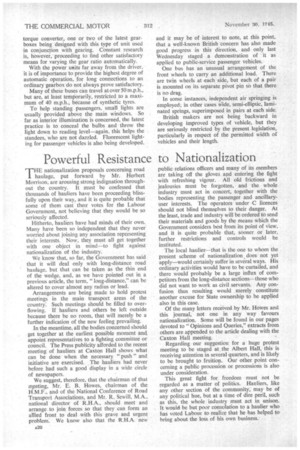Powerful Resistance to Nationalization
Page 22

If you've noticed an error in this article please click here to report it so we can fix it.
THE nationalization proposals concerning road haulage, put forward by Mr. Herbert Morrison. are arousing strong indignation throughout the country. It must be confessed that thousands of hauliers have been proceeding blissfully upon their way, and it is quite probable that some of them cast their votes for the Labour Government, not believing that they would be so seriously affected_ Hitherto, hauliers have had minds of their own. Many have been so independent that they never worried about joining any association representing their interests. Now, they must all get together with one object in mind—to fight against nationalization of the industry.
We know that, so far, the Government has said that it will deal only with long-distance road haulage. but that can be taken as the thin end of the wedge, and, as we have pointed out in a previous article, the term, "long-distance," can be altered to cover almost any radius or lead.
Arrangements are being made to hold protest meetings in the main transport areas of the country: Such meetings should be filled to overflowing. If hauliers and others be left outside because there be no room, that will merely be a further indication of the new feeling prevailing.
In the meantime, all the bodies concerned should get together at the earliest possible moment and appoint representatives to a fighting committee or council. The Press publicity afforded to the recent meeting of hauliers at Caxton Hall shows what can be done when the necessary " push " and initiative are exercised. The hauliers had never before had such a good display in a wide circle of newspapers.
We suggest, therefore, that the chairman of that meeting, Mr. E. B. Howes, chairman of the 1-if.M.F.. and of the National Conference of Road Transport Associations, and Mr. R.. Sewill, M.A., national director of R.H.A., should meet and arrange to join forces so that they can form an allied front to deal with this grave and urgent problem: We know also that the R.H.A. new #.20 public relations officers and many of its members are taking off the gloves and entering the fight with refreshing vigour. All old frictions and jealousies must be forgotten, and the whole industry must act in concert, together with the bodies representing the passenger and ancillaryuser interests. The operators under C licences should not blind themselves to their danger. At the least, trade and industry will be ordered to send their materials and goods by the means which the Government considers best from its point of view, and it is quite probable that, sooner or later, further restrictions and controls would be instituted.
The local haulier—that is the one to whom the present scheme of nationalization, does not yet apply—would certainly suffer in several ways. His ordinary activities would have to be curtailed, and there would probably be a large influx of competitors from the long-distance sections,—those who did not want to work as civil servants. Any confusion thus resulting would merely constitute another excuse for State ownership to be applied also in this case.
Of the many letters received by Mr. Howes and this journal, not one in any way favours nationalization. Some will be found in our pages devoted to "Opinions and Queries," extracts from others are appended to the article dealing with the Caxton Hall meeting.
Regarding our suggestion for a huge protest meeting to be staged at the Albert Hall, this is receiving attention in several quarters, and is likely to be brought to fruition. Our other point concerning a public procession or processions is also under consideration.
This great fight for freedom must not be regarded as a matter of polities. Hauliers, like any other section of the community; may be of any political hue, but at a time of dire peril, such as this, the whole industry must act in unison. It would be but poor consolation to a haulier who has voted Labour to realize that he has helped to bring about the loss of his own business.




























































